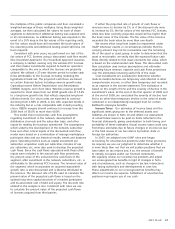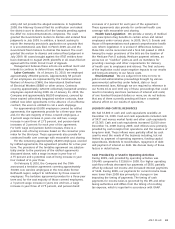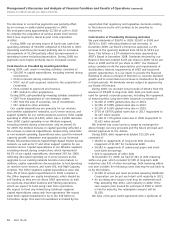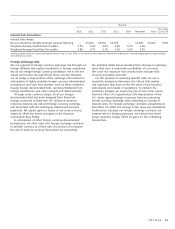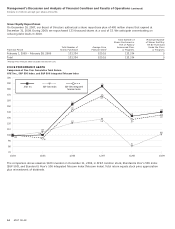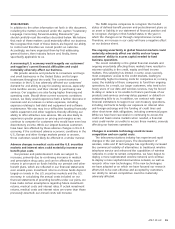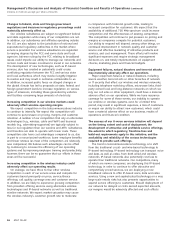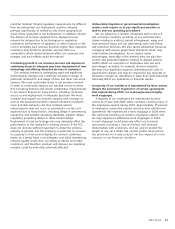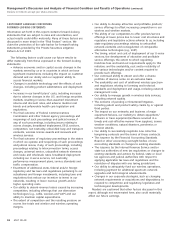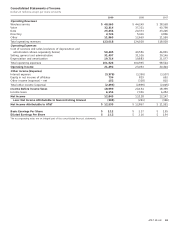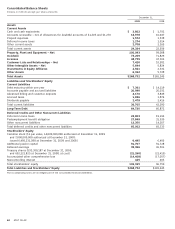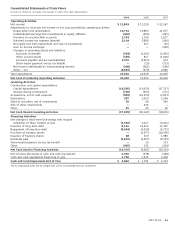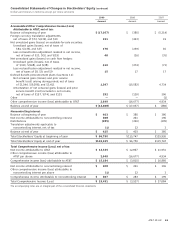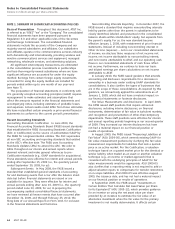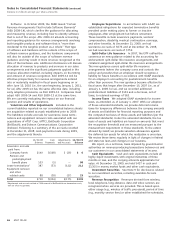AT&T Wireless 2009 Annual Report Download - page 59
Download and view the complete annual report
Please find page 59 of the 2009 AT&T Wireless annual report below. You can navigate through the pages in the report by either clicking on the pages listed below, or by using the keyword search tool below to find specific information within the annual report.
AT&T 09 AR 57
Unfavorable litigation or governmental investigation
results could require us to pay significant amounts or
lead to onerous operating procedures.
We are subject to a number of lawsuits both in the U.S.
and in foreign countries, including, at any particular time,
claims relating to antitrust, patent infringement, wage and
hour, personal injury, and our advertising, sales and billing
and collection practices. We also spend substantial resources
complying with various government standards, which may
entail related investigations. As we deploy newer
technologies, especially in the wireless area, we also face
current and potential litigation relating to alleged adverse
health effects on customers or employees who use such
technologies including, for example, wireless handsets.
We may incur significant expenses defending such suits or
government charges and may be required to pay amounts or
otherwise change our operations in ways that could materially
adversely affect our operations or financial results.
A majority of our workforce is represented by labor unions.
Absent the successful negotiation of certain agreements
that expired during 2009, we could experience lengthy
work stoppages.
A majority of our employees are represented by labor
unions as of year-end 2009. Labor contracts covering many of
the employees expired during 2009. Approximately 75 percent
of employees covered by expired contracts have ratified new
agreements. We experienced a work stoppage in 2004 when
the contracts involving our wireline employees expired, and
we may experience additional work stoppages in 2010.
A work stoppage could adversely affect our business
operations, including a loss of revenue and strained
relationships with customers, and we cannot predict the
length of any such strike. We cannot predict what will be
the provisions for a new contract nor the impact of a new
contract on our financial condition.
could be material. Should regulatory requirements be different
than we anticipated, our deployment could be delayed,
perhaps significantly, or limited to only those geographical
areas where regulation is not burdensome. In addition, should
the delivery of services expected to be deployed on our
network be delayed due to technological or regulatory
constraints, performance of suppliers, or other reasons, or the
cost of providing such services becomes higher than expected,
customers may decide to purchase services from our
competitors, which would adversely affect our revenues and
margins, and such effects could be material.
Continuing growth in our wireless services will depend on
continuing access to adequate spectrum, deployment of new
technology and offering attractive services to customers.
The wireless industry is undergoing rapid and significant
technological changes and a dramatic increase in usage, in
particular demand for and usage of data and other non-voice
services. We must continually invest in our wireless network
in order to continually improve our wireless service to meet
this increasing demand and remain competitive. Improvements
in our service depend on many factors, including continued
access to and deployment of adequate spectrum. We must
maintain and expand our network capacity and coverage as
well as the associated wireline network needed to transport
voice and data between cell sites. Network service
enhancements may not occur as scheduled or at the cost
expected due to many factors, including delays in determining
equipment and handset operating standards, supplier delays,
regulatory permitting delays or labor-related delays.
Deployment of new technology also may adversely affect the
performance of the network for existing services. If the FCC
does not allocate sufficient spectrum to allow the wireless
industry in general, and the company in particular, to increase
its capacity or if we cannot deploy the services customers
desire on a timely basis or at adequate cost while maintaining
network quality levels, then our ability to attract and retain
customers, and therefore maintain and improve our operating
margins, could be materially adversely affected.


